For 61 years, Briscoe Memorial School in the Kent countryside was home to thousands of boys — a haven, as one news account said, for "kids who have nobody or whom nobody wants."
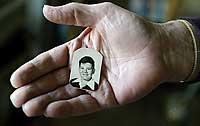
Earl Dye, 60, who says he was abused at Briscoe Memorial School when he was a child, holds a picture of himself taken one year before he entered the Kent-area institution about 50 years ago.
Photos: KEN LAMBERT / THE SEATTLE TIMES
But for some of those boys, the Roman Catholic boarding school was more like a prison.
Now grown and in their 40s to 70s, they say teachers at Briscoe dealt them severe beatings — sometimes with leather straps or fists, other times with wooden paddles while the boys were naked in the shower — that went beyond the acceptable norm for discipline at the time. They also talk of boys being taken from their beds at night by teachers, of being accosted in bathrooms, of being forced to engage in oral sex.
Four men have filed lawsuits in King County Superior Court alleging abuse at Briscoe, which closed in 1970. Other suits will soon be filed, said Seattle attorney Michael Pfau, who represents three of the men and whose firm has talked with more than 20 others who say they experienced or knew of abuse at Briscoe.
In the two years since national attention focused on past sexual abuse of minors by priests, most cases have accused individual clerics of wrongdoing and church officials of cover-up. But the men coming forward with allegations against Briscoe describe physical and sexual abuses that happened over decades, plaguing an entire institution.
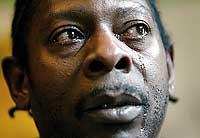
Eugene Davison, 50, of Seattle, reflects on his experience in sixth grade at Briscoe Memorial School.
"It was a place you could make a movie from — a horrifying movie," said Eugene Davison, 50, a Seattle day-care provider who lived at Briscoe from about 1964 to 1967. "If I hadn't lived it, I would never have believed that children could be treated like that."
Allegations elsewhere
The allegations are similar to accounts in other countries of abuse at institutions also run by the Congregation of Christian Brothers, the Catholic teaching order that managed Briscoe.
Brother Daniel Casey, a spokesman for the Christian Brothers' western U.S. headquarters in Joliet, Ill., said the brothers don't know if the Briscoe allegations are true. But "to any who've been hurt, we apologize and ask forgiveness," he said.
At the same time, other men who went to Briscoe praise the school, which has produced its share of notables, including military heroes, a former Seattle city councilman and a former King County Superior Court judge.
These supporters say while the strict brothers may have used disciplinary methods considered unacceptable now, they worry that airing allegations of past abuses will stigmatize all Christian Brothers and the good deeds they do.
"It's probably the best educational experience I ever had," said Robert Brooks, 54, who owns a public-affairs firm in Washington, D.C., and attended Briscoe as a day student from 1960 to 1963. "I feel morally obliged to speak up for a group of people who had such a strong, positive and lasting influence on my own life."
But the men making allegations say they, too, need to speak up — for justice, and so others who may have been abused won't feel alone. Some are planning a reunion of Briscoe alumni and urging those with information to come forward.
"I want someone in the universe to know we got wrecked," said Michael Cafferty, 57, a Vietnam War veteran and student at Shoreline Community College. Cafferty said he was beaten, sometimes daily, with straps, broomsticks and fishing poles while at Briscoe from 1958 to 1961, and that brothers asked him sexual questions.
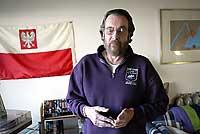
Earl Dye, shown at his Ballard home, says his experience at Briscoe caused him to lose his faith "for many, many, many years. I doubted the existence of God."
"It was some kind of hell that these people invented and we ended up in it," he said.
In son's memory
Briscoe Memorial School opened in 1909, built largely with money from a donor memorializing her son, Edwin Briscoe, who died at 29.
The school was owned by what was then the Diocese of Nisqually and is now the Archdiocese of Seattle. In 1914, at the request of Bishop Edward O'Dea, the Christian Brothers took over its operation.
Founded in 1802 by Irishman Edmund Ignatius Rice, the Christian Brothers order established schools around the world. Originally an orphanage, Briscoe was the only boarding school the order operated in the United States.
Over the years, the school began receiving state funds, taking in boys from troubled homes. At one point, it also started taking day students, whose parents typically paid their tuition.
About 100 to 160 boys, ages about 8 to 15, would attend Briscoe at any given time. About 10 brothers — men who take vows of poverty, chastity and obedience but are not ordained as priests are — would live and teach there. By the time the school closed, some 7,500 boys had gone through it.
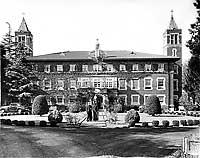
Briscoe Memorial School, as it appeared in May 1946.
Most of the brothers accused of abuse at Briscoe are dead.
Today, there are about 1,400 members of the order worldwide, according to Casey. In Seattle, about a half-dozen still teach at O'Dea High School.
O'Dea Principal Dominic Murray said the allegations about Briscoe date back so far "it's impossible for me to know or even determine if they're true. It saddens me to realize these kinds of things are possible."
Some of the Briscoe alumni making allegations learned of each other a year ago through a Web site established by people who had been abused by priests. Others came forward last month after news reports of a lawsuit involving Briscoe. They span generations and went to Briscoe at different times, so most didn't know each other until recently. Nineteen agreed to be interviewed.
'They were torture'
Decades ago, society was much more accepting of corporal punishment, the men alleging abuse acknowledge.
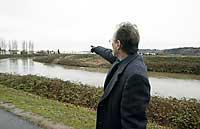
Michael Cafferty, 57, of Shoreline, points to the site near the Green River where Briscoe Memorial School was located. The area is now an industrial park. Cafferty stands in what students called "10 Acres," an area they considered a refuge from abuse. It is now Briscoe Park.
But what happened to them at Briscoe "weren't beatings, they were torture," said John Green, a 59-year-old technology consultant who lives near Everett and boarded at Briscoe in the 1950s. "It continued into self-gratification and rage. It had nothing to do with punishment."
The brothers carried leather straps — about a foot long and an inch or two wide — with which they hit students, the men say.
Jerry Blinn, 65, a retired business manager in Placitas, N.M., said students were punished for anything from getting wrong answers in class to talking in meal lines.
He said one brother would strap students so hard his feet would leave the ground. Blinn, who was sent to Briscoe in 1946 after his widowed, ill and impoverished mother was unable to take care of him, said some brothers also grabbed students by their ears or cheeks and shook them "like a bass on a hook."
Davison, of Seattle, who ended up at Briscoe about 40 years ago after he ran away from home, remembers being beaten with straps and fists — sometimes so hard he was knocked unconscious. "They beat me half to death there," he said.
He and some of the other men say they saw brothers beating naked boys with wooden paddles in the showers, and that some brothers had students fight each other.
"It was a truly brutal place," said Earl Dye, 60, a mental-health counselor in Seattle whose mother sent him to Briscoe around 1955 at the urging of nuns. "In the morning, you would think: 'I hope I don't get beaten today.' And every night you would hope you wouldn't be one of those boys that the brothers would pull out of bed."
Several of the men say they would sometimes see brothers take one or two boys out of their dorm-room beds for a while at night.
Pat Gogerty, retired executive director of Childhaven, a local agency serving abused and neglected children, said that happened to his brother, William Gogerty. William lived at Briscoe from about 1937 to 1945. Once, when Pat stayed overnight during a visit, he saw a brother take William out of the room.
"He was gone for a while," Pat Gogerty said. "He didn't talk about what happened (then). In those days, you never talked about anything like that." Years later, his brother told him he had been sexually abused at Briscoe, starting from his first day there at age 8.
Gogerty decided to tell his brother's story after William died last year. His brother, he said, was a Korean War hero, but also a sex offender who spent most of his life in prison. Gogerty doesn't blame Briscoe for his brother's criminal actions. But he thinks "the particular focus on that behavior — the sexual offenses — was learned at that place."
Ray Ekins, 68, of Spokane, one of the four men who've filed suit, said he was forced to perform oral sex at age 8, on his first day at Briscoe, having been sent there after his mother died.
Over the next four years, he said, he was made to engage in fondling or oral sex by various brothers in the showers, sports locker room, classrooms, infirmary, brothers' bedrooms and in a dressing room by a lake where the students would swim. Several brothers told him if he said anything or resisted, "you wouldn't go to heaven," he said.
Ekins said the brothers also accused him of faking epileptic seizures, beating him each time he had one. "I was scared day and night," he said. "It's a lifetime of suffering."
Dale Southwick, 51, of Soldatna, Alaska, attended Briscoe from 1964 to 1968. He said a night watchman sometimes accosted him as he went to the bathroom, fondled him and forced him to engage in oral sex.
Dye said he twice told the brothers he had been sexually abused by a cook, but nothing was done. Dye, who grew up in a Catholic home, said his Briscoe experience "made me lose my faith for many, many, many years. I doubted the existence of God. How could he let these men, who were supposed to be servants of God, do these things?" Allegations elsewhere
Similar allegations against other Christian Brothers institutions worldwide emerged in the 1990s.
In Canada, the order dissolved to help pay a settlement with 90 victims abused over several decades at Mount Cashel orphanage in Newfoundland.
In Australia, more than 250 former residents of boys homes filed suit, saying they'd been beaten and sexually abused.
In Ireland, more than 300 former students alleged abuse dating back decades. "In a way, we are putting our hands up and saying this happened," a Christian Brothers spokesman is quoted as saying in a news account.
No statistics exist to say whether abuse within this particular order was more prevalent than in other orders, the church in general, or society at large.
But "the fact is they have had a lot of schools for boys all over the world, and in many of these schools, physical and sexual abuse went on rampantly and was not corrected or checked," said the Rev. Thomas P. Doyle, a Roman Catholic priest, victim's advocate and canon lawyer.
Doyle attributes the abuses to various factors, including the brothers' lack of proper education about sexuality and chastity and the attraction to religious life of men who were troubled sexually and "thought if they prayed hard enough, it would go away."
Voicing support
Since news accounts ran of last month's lawsuit, several men have come forward to support Briscoe and the Christian Brothers.
Brooks, the Washington, D.C., resident who was a day student at Briscoe in the early 1960s, said he never witnessed or heard of sexual abuse during his years there and characterizes the punishments the students received as, generally, "a swat or two on the knuckles. ... I would never think of doing that now to my kids. But that's the way it was in those days, and it didn't do me any harm."
Warren Pugh, a 71-year-old retired teacher in San Leandro, Calif., called his 1942-47 stint at Briscoe "probably one of the most positive experiences I've ever had. I learned discipline. I learned to sing. I learned the Latin language." Still, Pugh believes the sexual-abuse allegations and says it's possible for the differing portraits of Briscoe to coexist.
Jim Keough, 63, of Edmonds, who attended O'Dea in the 1950s and knows someone he says was physically abused at Briscoe, said "there is no way what I guess happened at Briscoe should have happened. But I love the brothers. There's a lot of young men out there that need the structure, the care, the love that the brothers give."
Doyle, the canon lawyer, agrees the Christian Brothers "have made a massive contribution to not just the Catholic Church but to society. They've provided access to education for those who might otherwise not have gotten it.
"But I don't believe in saying 'look at all the good they've done,' and using that as a denial mechanism to gloss over the evil," Doyle said. "People say: 'Well, what about the good priests?' That's not the point. The point is taking care of the victims of the bad ones and making sure the bad ones are taken care of themselves." Responsibility of archdiocese
The lawsuits also raise legal and moral questions about what responsibility the Seattle Archdiocese bears for religious orders operating within its geographic boundaries — especially if an order appears to have done nothing about complaints.
One man coming forward now said his grandparents told Briscoe officials about his alleged sexual abuse in 1949, but the abuse continued.
Casey, of the Christian Brothers, said the brothers' Illinois headquarters had heard of one allegation of abuse at Briscoe many years ago but was unable to find specifics. He said the first specific allegations came last year with an accusation against a brother who had taught at Briscoe and, until he was removed last year, had continued volunteering at O'Dea. Casey said that brother did not wish to comment.
Archdiocese attorney Michael Patterson said the church and Christian Brothers signed a contract giving the brothers sole possession and management of Briscoe. "We do not believe that we have any legal responsibility for what occurred at Briscoe," Patterson said. "It was totally and absolutely within the control of the Christian Brothers."
Plaintiffs' attorney Pfau contends the archdiocese does have oversight responsibility, especially given that in 1957, according to Pfau, a couple told Archbishop Thomas Connolly about alleged abuses at Briscoe.
Doyle agrees, saying church law states a bishop is responsible for everything that happens in his diocese.
Ultimately, the court will decide who's legally responsible. In the meantime, when the Seattle Archdiocese receives an abuse complaint against a defunct institution run by a religious order, its policy is to offer to help the victim get counseling and to forward the complaint to the order, said spokesman Greg Magnoni.
Selling Briscoe
In 1968, the Seattle Archdiocese announced the sale of the Briscoe property to Union Pacific Railroad for about $2.8 million.
Casey, of the Christian Brothers in Illinois, believes the school was closed because of dwindling resources and an influx of troubled kids the staff wasn't trained to help. Magnoni believes it closed because the building was old and crumbling and sitting on land that had grown in value.
Given the decades that have passed, the men coming forward know they will be asked why they didn't do so earlier. Some say they blocked out what happened at Briscoe in order to survive.
"Back then you thought it was normal, and you thought it was your fault for whatever they did," said Blinn, the New Mexico retiree. "When I got out of there and found out the whole world was different — man, did I shut that sucker down. I shut it out of my mind."
Accusers also may be coming forward now because conditions — including the men's maturity and public allegations of abuse within the church and at Briscoe — have created a perfect storm of sorts, said the Rev. Dr. Marie Fortune, an expert on abuse by clergy.
"One of these variables alone wouldn't be sufficient for some people," she said. "But when they converged, it probably gave them permission to talk."
In addition to filing lawsuits, some of the men are establishing an informal group called Network of boys Abused by Brothers. They plan to send letters to O'Dea alumni, seeking information about Briscoe. And they're planning a reunion of Briscoe alumni for May in Seattle.
Cafferty, for one, has mixed feelings about that. "What we have in common is we went through this horrible experience. We're going to have a reunion and talk about who got beat the most or who got screwed?"
Still, he says, "If they hold a reunion, I might go. I would just like people to know there was a systemic failure. It wasn't just a happenstance thing with one guy. This, and what so many other people went through, did happen."
Janet I. Tu: 206-464-2272 or jtu@seattletimes.com